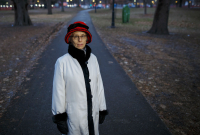Support strong Canadian climate journalism for 2025
A continuation of a previously featured series, Faith & the Common Good looks at perspectives concerning the intersection of climate breakdown, faith and moral duty, and examines the role of religious leaders in advancing an equitable, anti-racist, life-supporting climate and world for all.
The year 2020 forever changed the world for us. Adding to the climate crisis, two additional crises — a global pandemic, and the long-overlooked racism against Black people, brought into focus by the vicious killing of a Black man at the knee of a white police officer. These events forced us to acknowledge the inhumane systems our societies are built and operate on, and the increasing vulnerabilities these systems create, while still benefiting the privileged and ruling classes.
Our world is broken. At the intersection of three inextricably connected crises, in the midst of horror, fear and sorrow, how do we repair it? The Jewish faith tradition has some hopeful teachings that can help with the answers.
Quoting from the Torah, “Tzedek, tzedek tirdof (justice, justice you shall pursue),” Rabbi Dan Moskovitz of Temple Sholom in Vancouver aims for the heart of the matter.
To repair the world — be it climate, disease, the economy, the way we relate to one another, the way we treat the Earth — we must seek tzedek, the Jewish value of righteousness, which as Rabbi Dan explains, refers to “justice in the eye of God; a holy justice” that is sensitive to the vulnerabilities of others.
“This is repeated throughout the Torah; you must be just, but you have to pursue justice for others,” he says.
***
Now that the three crises have exposed forevermore the deeply rooted inequities of our societies, many of us are compelled to look within ourselves and acknowledge our own complacency and privileges, and how we are complicit in systems of oppression.
We shouldn’t have to go through a crisis to have healing and growth, according to Rabbi Dan, “but we absolutely have to learn from it. What I try to say in my congregation is: This is a test of us, how we respond to emergencies.”
For some of us, stepping out of our comfort zones to put ourselves on the line for others can feel frightening; it can make us want to run and hide and wait for things to “return to normal.”
But these tectonic shifts in society, which Rabbi Dan refers to as “ruptures in the fabric of ‘normalcy,’” call on us to recognize that we can’t keep living as we have been: “Life-changing events have to be life changing,” he says.
As a way to counter feelings of distress, Rabbi Dan suggests becoming familiar with “holding complexity,” a concept upon which Judaism is built and that “implores us to be conscious of both privilege and suffering, not only mine and that of our people throughout history, but of others as well.”
With regard to the virus, Rabbi Dan describes the “great pause” it has created from a religious context, in that the Bible speaks about the sabbatical year, and giving things a rest: “There are eternal truths about human activity and relationships. The silver lining for this crisis has been that our society has had to rest, we are not home enough.”
Rabbi Dan notes that what we learned about the environment when we remove ourselves is that the planet has been healing. “We are clearly part of the problem. Our Earth has had a heart attack. Are we going back to eating fries?”
We are part of the problem, but we are also part of the solution, and we have the opportunity to repair the world as it should be, not as it was.
Rabbi Dan urges us to “Wake up! Our planet needs us, our democracy needs us, our fellow citizens — especially those who don’t look like us — need us.”
He invites us to plan for what we want and go for it with intention. For people of faith, prayer is one way to strengthen our resolve: “The purpose of prayer is the motivation for action; God is the medium.”






Comments
I am uplifted from discomfort, fear and alienation by this teaching. Being sensitive can offer help for our world and this is how I belong here. I can pay attention to others as they experience discomfort. Repairing the world sounds grand but it keeps me from despair.
Be that as it may. A reality encopmases the physical space we live in. The Earth! It is proving to be finite for practical purposes, like an island only more so. We and all life are confined within it's parameters. It is like a planetarium and aquarium rolled in one., perhaps to coin a word a "lifearium" . It has raised us and sustained us as a species among untold others. Perhaps more have gone extinct than survive today. The law of survival seems to be adapt or perish. We now, with our knowledge and technical advancements have expanded our "take" of what the "lifearium" has, well past it's capacity to sustain much longer. The year 2050 ,or thereabuts is said to be the date by which we as a species must adjust our "take" to a sustainable level, or we will have completed the journey to extinction. Will be do it humainly? That would be a human construct, one that the laws of Natural survival may not value, so care must be taken to not let that prevent achieving sustainable human cultures that this old Earth can sustain. There seem no other options, sustainability or extinction! At the moment that is how I read the information at hand and readily available on the internet. Still a chance for our progeny's progeny, but fleeting as we fiddle.